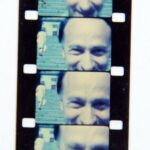
Mekas Jonas
Pioneer of avant-garde cinema, poet, film critic, curator, philosopher
Biography
Jonas Mekas was born on December 23, 1922, in Semeniškiai, Biržai District, Lithuania, into a farming family. He grew up with his sister Elžbieta and four brothers: Povilas, Petras, Kostas, and Adolfas. He graduated from Biržai “Saulė” Gymnasium.
During the first Soviet and later German occupations, like many young people, Mekas became involved in anti-Soviet and anti-Nazi resistance. In the winter and spring of 1944, he worked underground typing out hand-written texts passed to him in secret. He helped publish underground newspapers like Į laisvę, Tautos žodis, and Nepriklausoma Lietuva. His typewriter’s font became recognizable and was sought by both German and Soviet security forces.
In 1944, to escape persecution, Jonas and his brother Adolf fled Lithuania but ended up in Nazi POW camps in Elmshorn for eight months. After the war, from 1946 to 1948, he studied philosophy at the University of Mainz. In 1949, the brothers emigrated to the United States, settling in New York City.
Avant-Garde Cinema Pioneer
Just two weeks after arriving in New York, Jonas borrowed money to buy his first Bolex film camera. He began documenting the life of Lithuanian immigrants, which later became his lifelong visual diary and the foundation of his global reputation.
He founded the Film Study Group, began screening avant-garde films, and worked at Graphic Studios, preparing photoreproductions for Life magazine. Lacking English fluency at the time, he turned to cinema as a universal language—a medium through which he could reach people regardless of nationality or background.
Mekas blurred the boundaries between amateur and professional filmmaking, between fiction and documentary. His works, created with a simple camera, formed a unique, deeply personal cinematic diary.
1954 – Launched the journal Film Culture
1958 – Started the Movie Journal column in The Village Voice
Organized the New American Cinema Group and avant-garde film festivals
Published in Film Culture Magazine, Sight and Sound, Cahiers du Cinéma, The New York Times, and more
He worked with and befriended iconic artists like Jurgis Mačiūnas, Andy Warhol, Nico, Allen Ginsberg, Yoko Ono, John Lennon, and Salvador Dalí.
Jonas Mekas – Writer and Poet
Mekas’ literary voice was as refined as his filmmaking.
His poetic debut came accidentally when a classmate secretly showed his poems to a teacher, leading to his first reading at school. In 1936, he debuted in print with poems and prose in publications like Vyturys, Jaunasis ūkininkas, and Lietuvos ūkininkas.
1946 – Published Three Brothers and Other Tales (with brother Adolfas)
1947 – Released Semeniškiai Idylls, awarded the Vincas Kudirka Prize in 1957
In his acceptance speech, he emotionally reflected on his homeland:
“Perhaps my book is just a gravestone, a gravestone for Semeniškiai as I knew them… They are no longer the same, only in me they remain.”
His writing centers around family, friendship, memory, emotion, and nostalgia—deeply rooted in his unique and often painful life journey.
His connection with Yoko Ono and John Lennon was particularly meaningful:
“They symbolized 1968. Through pacifist actions and radical creativity, they showed us what true freedom looks like. They were free.”
He later recounted this friendship in his book Three Friends.
Selected Works
Man Without a Place: Nervous Diaries – covering his life from Soviet re-occupation to immigration to the U.S.
Diaries, Notes, Sketches – a lifetime of poetry, fragments, and reflections
“I decided to publish everything, from the beginning, from childhood, in diary form. Don’t expect pure poetry. Take this book as a friendly sharing of my journey through life.”
Awards and Recognition
Jonas Mekas received numerous awards, grants, and honors for his contributions to cinema and culture:
1966 – Gold Medal, Philadelphia College of Art
1977 – Guggenheim Fellowship Nominee
1989 – Brandeis University Award
1992 – Mel Novikoff Award, San Francisco Film Festival
1992 & 2000 – Chevalier de l’Ordre des Arts et des Lettres, French Ministry of Culture
1995 – Lithuanian National Prize for Culture and Arts
1996 – Doctor of Arts, Kansas City Art Institute
1996 – NYC Film Critics Circle Award for contributions to cinema
1997 – Pier Paolo Pasolini Award (Paris); IDFA Documentary Award (Los Angeles); Skowhegan Award (USA)
1997 – Honorary Doctorate, Vytautas Magnus University
2003 – Grand Cross of the Order for Merits to Lithuania
2006 – Directors Guild of America Award (for Anthology Film Archives)
His film Reminiscences of a Journey to Lithuania was selected for the U.S. National Film Registry, and the Los Angeles Film Critics Association honored him for his contributions to American film culture.


